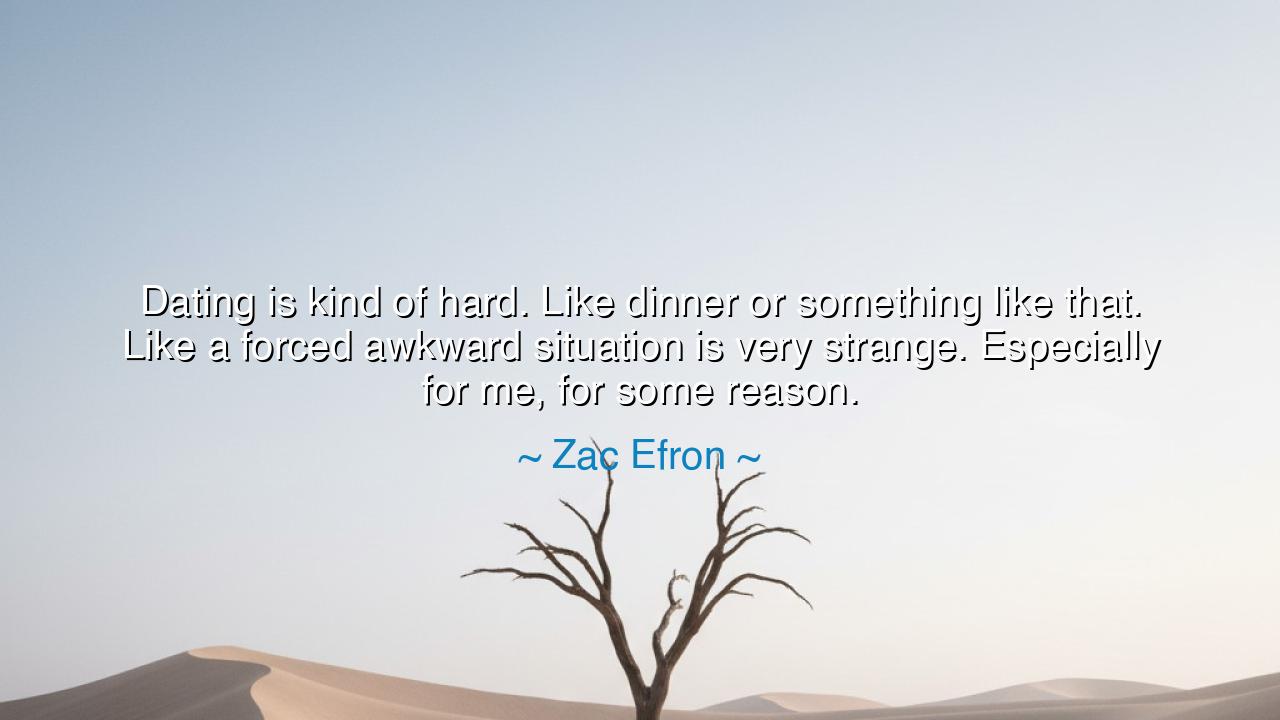
Dating is kind of hard. Like dinner or something like that. Like
Dating is kind of hard. Like dinner or something like that. Like a forced awkward situation is very strange. Especially for me, for some reason.






In the words of Zac Efron, “Dating is kind of hard. Like dinner or something like that. Like a forced awkward situation is very strange. Especially for me, for some reason.” — there is a confession that seems simple at first, even lighthearted, yet it carries within it a quiet and universal truth about human vulnerability, expectation, and the search for authentic connection. Beneath his unease lies the ancient struggle of the human heart — the tension between what is natural and spontaneous in love, and what becomes staged and performative when society tells us how love should appear. In these words, we see the soul of one who desires sincerity in a world often ruled by appearances.
The ancients, too, understood this conflict. In their time, courtship was often a matter of ritual, family, and formality — a dance of manners that bound the heart in chains of duty. Yet even then, poets and philosophers spoke of the awkwardness of love that tries too hard to follow the world’s rules. Ovid, in his Ars Amatoria, taught that love is a subtle art, one that cannot be forced or rehearsed. To him, the most genuine affection grew not from staged encounters or fine words, but from moments where the heart forgets itself and acts freely. Efron’s modern discomfort — this sense of the “forced awkward situation” — echoes that same wisdom: that love loses its power when it is shaped more by performance than by truth.
In his reflection, there is also the cry of the individual seeking authenticity. For Efron, a man whose life has been lived under the gaze of millions, the act of dating becomes not an intimate exchange, but a kind of theater. How many of us, in our own way, have worn masks in the presence of others — trying to seem more confident, more composed, more charming than we truly feel? The dinner table he describes becomes a stage, the candlelight a spotlight, the conversation a script rehearsed too many times. Yet the heart, that ancient instrument of truth, beats awkwardly beneath it all, yearning to be seen as it is. This is why the situation feels strange — because love cannot flourish where pretense replaces presence.
The great philosopher Søren Kierkegaard, who lived centuries before Efron, once wrote that “the greatest hazard of all, losing one’s self, can occur very quietly in the world, as if it were nothing at all.” In the awkwardness of the dinner date, we glimpse that hazard — the risk of losing one’s authentic self in the attempt to impress another. The strangeness Efron feels is not weakness, but awareness — the spirit rebelling against falseness. Like the heroes of old who refused the masks of conformity, he longs for something deeper: a meeting of souls, not of performances. This longing, this refusal to settle for the superficial, is the essence of courage in an age obsessed with image.
And yet, there is tenderness in his words. He does not condemn the awkwardness; he accepts it as part of the human condition. To find love, we must often walk through discomfort. The awkward silence, the uncertain glance, the fumbling word — these are not failures, but proofs of sincerity. They are signs that one cares enough to risk imperfection. The ancients called this the noble vulnerability of love — the willingness to be seen as incomplete, to risk rejection in order to find truth. Even the mighty Achilles, invincible on the battlefield, faltered in the presence of Briseis, for the heart knows no armor that can protect it from longing.
In this way, Efron’s admission becomes a mirror for us all. It reminds us that love, at its core, is not a performance to perfect but a journey to embrace. The awkwardness he speaks of is the sign of authenticity — proof that something real is trying to emerge. The wise know that the best connections often come not from perfect moments, but from imperfect ones: laughter at spilled wine, a stumble over words, a shared silence that feels honest instead of empty. These are the moments when the masks fall away and the soul begins to speak.
Thus, the lesson we must carry forward is this: do not fear the strangeness of connection, for it is the gateway to truth. When we meet another, let us not seek to impress, but to understand; not to perform, but to be present. The ancients taught that love is not found by those who chase it, but by those who live truthfully, and allow love to recognize them. So, if the dinner feels awkward, let it be awkward; if the silence lingers, let it linger. For beneath that stillness, the soul is learning to listen.
In the end, Zac Efron’s words reveal a modern truth that is also eternal: that the path to love is uncomfortable precisely because it is real. The heart stumbles before it walks, trembles before it speaks, and in its trembling, becomes strong. Embrace that awkwardness, dear listener, for it is the proof that you are alive, that you are seeking something genuine in a world of imitation. And when you find someone who meets you not through masks, but through shared imperfection — then you will know that the strangeness has given birth to something sacred. For love, though clumsy at first, always teaches the soul how to move in its own rhythm.






AAdministratorAdministrator
Welcome, honored guests. Please leave a comment, we will respond soon